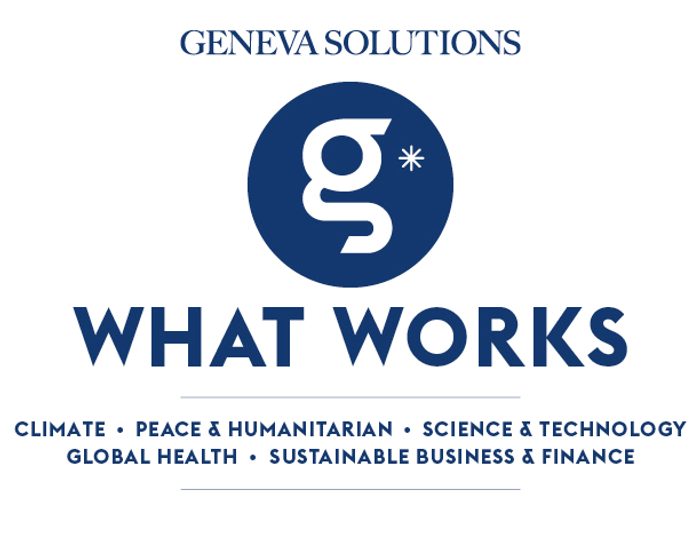Good morning, this is Paula. As Geneva’s annual forum on peacebuilding wraps up at the end of a week that began with renewed hope of a lasting ceasefire in Gaza, we hear from experts with firsthand experience on what it takes to get guns to go silent.
Veteran mediators involved in peace talks across the globe spoke at Geneva Peace Week about how context, and ultimately, political will of the warring parties mattered most in achieving successful ceasefire negotiations. |

|

US president Donald Trump and Egypt's president Abdel-Fattah el-Sissi sign documents to support ending the more than two-year Israel-Hamas war in Gaza, in Sharm El Sheikh, Egypt, 13 October 2025. (Keystone/AP Photo/Evan Vucci)
|
|
From Gaza to Sudan to Ukraine, ceasefires have become the currency of modern conflict resolution – fragile lifelines amid relentless wars. But despite their ubiquity, understanding what makes a ceasefire work lags behind in the study of peace processes, as observed by Govinda Clayton, mediation support manager at the Centre for Humanitarian Dialogue.
On Tuesday, a day after Hamas and Israel exchanged hostages and prisoners in the first phase of Trump’s 20 point peace plan, Clayton and other experts spoke at Geneva Peace Week about past experiences of peace talks mediation, and how political negotiations interact with ceasefire discussions.
At the panel, the former peace envoys involved in talks spanning continents described a variety of conditions that allowed for what Clayton termed “ceasefire opportunity space” – a shared interest among warring parties to proceed with political discussions, even when they did not want the fighting to end – or when that could not be achieved.
Read the full story on Geneva Solutions.
|
|

Private jets at Engadin Airport in St Moritz, 9. March 2025. (Keystone/Peter Klaunzer)
|
|
💰AID AND WEALTH.
As aid budgets shrink, Olivier de Shutter, the UN special rapporteur on extreme poverty and human rights, has joined renewed calls in France, Britain and elsewhere to tax the ultra-rich to help the world’s poorest 820 million people living on less than two Swiss francs a day.
In an interview with Spanish newspaper El País, the Belgian says that a two per cent taxation on 3,000 of the world’s richest billionaires would be “more than enough” to provide social protection for the entire population of the world’s 26 poorest countries – or twice the amount of development aid funding in 2019. “All that’s needed is political will,” he said.
|
|
Tax talks.
While it might sound far from reach, the idea has been gaining traction. In 2024, the G20 agreed to work on Brazil’s idea to tax the billionaires, though they disagreed about the right forum. For NGOs, a future UN convention on tax, for which negotiations began this year, offers a perfect opportunity. Still, they face an uphill battle. Washington decided to walk out of the talks earlier this year, while other wealthy nations are cautiously taking part.
|
|
Here’s what else is happening
-
💸Proposed UK cuts to global aid fund could lead to 300,000 preventable deaths, say charities.
The UK is planning to slash its contributions to the Global Fund to Fight Aids, Tuberculosis and Malaria by up to 20 per cent, with a confirmation expected by next month’s G20 Summit in South Africa. It would add to a 25 per cent cut to Gavi funding reported over the summer.
The Guardian (EN)
-
⚙️Amy Pope: The migration system doesn't work.
Governments that have largely addressed migration through a border management or security lens need a new approach, the International Organization for Migration boss said in an interview where she also addressed the major cuts taking place within the agency.
Devex (EN)
-
🇹🇳In Tunis, Swiss citizen who registered asylum seekers under UNHCR authority awaits verdict.
Mustapha Djemali, who worked in Geneva for 25 years at the UN High Commissioner for Refugees, was imprisoned in May 2024 for creating an organisation, funded by the agency, that legally registered asylum seekers in Tunisia.
Le Temps🔐 (FR)
-
🗣️Opinion: The UN needs a major reset. A Charter review could make it happen.
Advisers at Article 109, a coalition calling for an overhaul of the UN Charter, make the case for holding a conference to review the organisation’s founding document as set out in the article that lends the coalition its name.
PassBlue (EN)
-
🧠Rethinking humanitarianism. The global backlash on gender rights.
In this podcast, Saskia Brechenmacher, senior fellow at the Carnegie Endowment for International Peace, sets out how concerned people – including civil society and non-governmental organisations – can counter the threats to women’s and LGBTQI+ rights.
The New Humanitarian (EN)
|
|
GS news is a new media project covering the world of international cooperation and development. Don’t hesitate to forward our newsletter!
Have a good day!
|

|
|
Avenue du Bouchet 2
1209 Genève
Suisse
|
|
|
|









